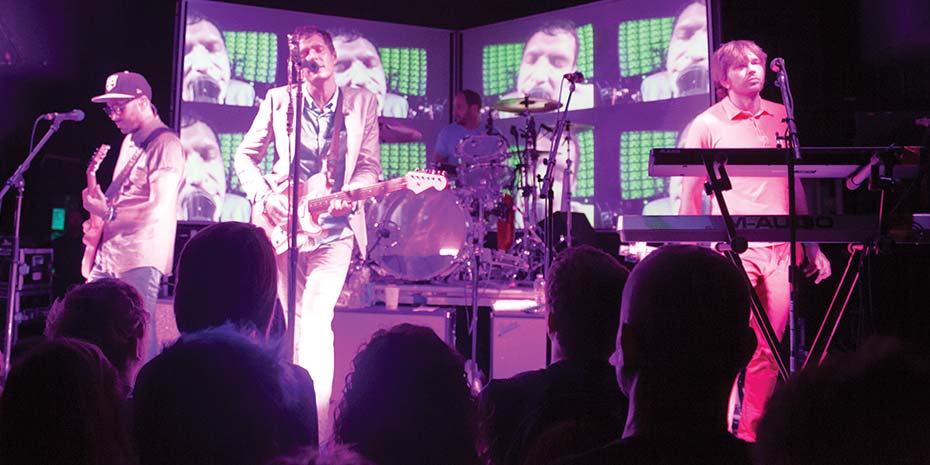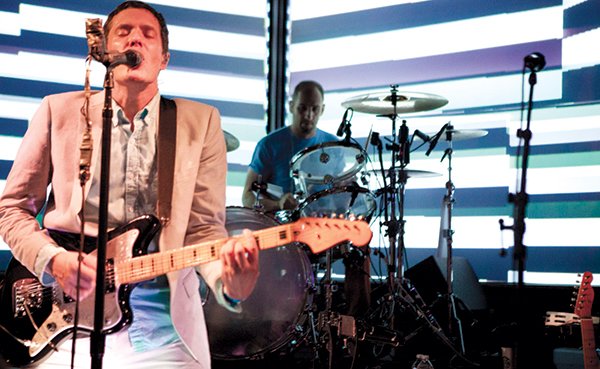Ok Go


Ok Go is a band very much of the Internet Age. Already a young group with a rapidly growing fan base, the Chicago-based four piece was propelled to worldwide fame on the strength of a continuous string of inventive and breath-taking videos that have gone beyond viral and garnered over 150 million views online. Such drastic and massive ‘internet fame’ put the band squarely on the radar of fans across the globe, but also has provided the band with its own unique set of challenges—from finding a way to monetize their success, to avoiding becoming a cute, fly-by-night internet sensation that is easily forgotten in today’s 24-hour news cycle, to surviving beyond being a (massive) one hit wonder. OK Go’s story is also the story of the music industry as a whole at a crossroads—a place where the old, failed business model has been outdated and proven inefficient by technologies that are literally advancing at the speed of light.
Beyond the inventive and ‘did you see that?!?!’ videos is a relentlessly hard-working band that has now been crafting smart pop-rock songs for over fifteen years and will be releasing it’s fourth record, Hungry Ghosts, this October via their own Paracadute label. Described by front-man Damian Kulash as a “21st Century Maker of Creative Things,” the intriguing endeavor has released records by Lavender Diamond, Infinity Shred, and bassist Tim Norwind’s Pyyramids side project. It has also spread its wings with video projects and even an app developed by band member Andy Ross.
The band was inspired to start Paracadute after their immense frustration with the major label system reached a boiling point and they asked Capitol to drop them from their contract—an act that many bands would consider utter madness. The confident move is just one of several in a band history that reads like a timeline of the industry in the new century: creative young minds understanding the potential of all this new technology for blurring the traditional lines of art and distribution while the Old Money in charge of the major labels struggles to keep up. It’s an intriguing story, and I was lucky enough to sit down with Kulash and Norwind ahead of their recent show at the Hawthorne Theatre to discuss that and other topics.
ELEVEN: I wanted to first ask about the decision to part ways with Capitol Records and not only start your own label, but a multifaceted company that “makes stuff.”

Damian Kulash: When we left Capitol Records, we had to quickly decide if we were going to go with another major label, an indie one, or start our own thing. But it was a pretty easy decision to go our own route because most of the problems we had with the label weren’t specific to that particular company. It more had to do with the label system overall. If we wanted to do things like plan tours, release albums, make our videos on our own, and do things like release the app, we needed a “company” for all of these endeavors to fall under. We actually tell other people not to call it a record company because it’s really just the business office of whatever stuff we want to make. We’ve done some traditional things like release records for other bands, produced video content for other people, and stuff like that. . . but I guess in terms of the business entity, it’s there as a matter of convenience and helps us shape whatever ideas we may have by whatever means are necessary.
11: One thing that probably wouldn’t have gone over well at the label was the idea to release an EP that is basically a preview of your upcoming LP.
DK: Ha, no. They probably would have just said, “Well how do we make money off of that?” We believe in the record and wanted to go ahead and get it out there. We really love getting things like that out to the fans.
11: Once the decision was made to leave the label, how long did it take you guys to come up with the basis for this new label/business venture?
Tim Nordwind: [laughs] Well we were touring the record at the time…
DK: Yeah so Capitol had released our album and it had been less than a month when we got them to let us off the label. We basically said to them, “Look, it’s not worth it having these same arguments over and over about how we want the money spent or what we should be doing. If we can’t get on the same page, can we just have our record back?” It was basically the nuclear option, and fortunately they relented and gave us the record back. So we knew right then we had to come up with a company to deal with things like getting the record out into the world. You’d think setting up Amazon and iTunes stores would be easy, but even the smaller steps take time since you have to learn all that on the fly.
11: And you were in the middle of a tour when you were trying to figure all this stuff out?
TN: Ha, yeah! We were actually in Europe!
11: Oh wow. That probably didn’t help. . .
DK: [Laughs] No, it didn’t. Fortunately we already had a bit of a digital team in place, so it was a matter of getting with them and learning a new set of skills. Now what we’d like to do is expand that into a broader platform. What’s great about the existing defined categories of touring versus videos versus bands is that everything is easy to find and is accessible. When we make things like songs or a tour, we know where to put them so to speak. But the downside is that it can be really limiting for a band like us who wants pursue different creative endeavors when you need to go on tour for a year and a half. Our band can only be four people, and we’ve collaborated with so many great artists—from dancers to engineers to technologists—that we want our creative and entrepreneurial entity to be able to tie all these different facets together into whatever comes next for us creatively. We want to have the freedom that when an awesome idea comes around then that’s what we concentrate on, instead of the traditional forms of releasing albums and then videos and touring. We want to start a festival next year if we can that would be a music festival, but one where we can bring a lot of our various interests into the live arena that would have lot of the feel of a rock show but would also be totally different. We’ve been calling it a “conference,” which is a really annoying and business-y term, but so many of the great people that we work with only have access to people in their own fields and communities—and that’s so limiting. The biotech people only work with the biotech people, for example, but when you put them in a room with a bunch of really smart choreographers, something amazing happens. And in between our videos and designing the stage show, we’ve been a part of a lot of amazing collaboration. But it would be nice not have to have the band be in the middle of that, and that’s where the company comes in.
11: Does the band have a powwow and decide when it’s time to begin this huge creative process over? It seems like a Herculean effort.
DK: It is. We love all the different parts, but you’re right—it’s a very large undertaking; getting the press’ attention, getting radio’s attention, reminding people we’re still here. It’s really non-stop usually, but the last six months or so Tim released two records with his other band Pyyramids, I produced a Lavender Diamond record, and we released the app. So we all got a small break from OK Go, but we were working on projects through our label all the same. But usually as soon as we come back from touring we start writing or working on the next video or something.
11: And with OK Go the videos have become such a part of the band’s identity, and people expect so much—does that ever begin to feel like an added weight or pressure?
TN: Well other bands probably have a little of that. It’s just that with us, we’re so hands on with the videos and so much thought goes into them.
DK: Even in a standard performance video, there is a production company that spends a month working on it. With us, we’re the production company that’s doing the extra work. To be honest, it’s a sort of naive and a wildly inefficient business model, but we do a little bit of a lot of things. If someone is going to make a 3 and a half minute film about the band, we want it to be us. But that means you have to learn to be filmmakers. I know more about camera lensing than I ever dreamed I would. And for me that’s thrilling, but I know that for a lot of musicians that’s incredibly tedious. There are times I wish we’d come home from tour and have a month off rather than going right back to work, but if we didn’t have all these different parts I think we’d start to feel repetitive. I love that when we’re done with a tour we start a big art project.
TN: We put the pressure on ourselves; if we’re not interested in doing something, then we’re not going to have someone else telling us we need to be doing it.
11: Since Portland is filled with creative types who’d love to emulate your success, what advice would you have for them?
DK: I’ve found that often you make your best work when you don’t know what exactly it is you’re creating. It’s really hard to stay honest to yourself early on; you see something is being successful and you want to emulate that. I remember starting songs and thinking, “This isn’t what we sound like. This isn’t really us,” because we’re a rock band with four white dudes. . . but that was totally wrong. Whatever idea is most interesting to you is the right one, and the one you should pursue. In a weird way, the videos really helped us follow our hearts and our “craziest” ideas musically, and are probably part of the reason each of our records have sounded so different. We try and use the ideas that are turning us on at the time and don’t try and repeat past success.
11: And there is obviously a bit of risk involved with that. . .
TN: There definitely is, but that’s what keeps it exciting for us.
DK: Yeah, exactly. But to bring it back to what you were saying, if I had some advice for young artists it would be along the lines of when something breaks through for you, trust it. Whether it’s recording a simple song or beginning a wild trans-media project, believe in the purity of your vision. It’s hard to embrace that feeling of “I don’t know what exactly I’m making,” in the beginning, but it can be very rewarding. Don’t be a filmmaker who’s trying to make a short so they can get a commercial, and then in turn get a feature-length film made. Just be an inspired person who creates something and start from there. Chase your best idea. »
– Donovan Farley



